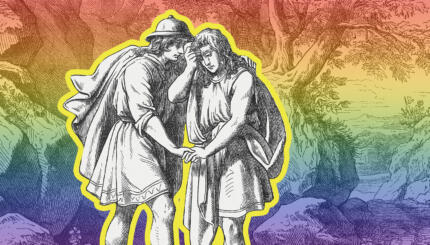Commentary on Parashat Achrei Mot-Kedoshim, Leviticus 16:1 - 20:27
Provided by American Jewish World Service, pursuing global justice through grassroots change.
One afternoon during an Introduction to Jewish Philosophy class, my professor posed the following question: If you are walking by a swimming pool, and you see someone drowning, what is your obligation to intervene? Must you dive in? Call for help? Throw her a line?
According to American law, there is no legal obligation to rescue a person in danger. Jewish law, however, provides a different answer. The duty to positively act to save a life comes in this week’s portion: “Do not stand idly by the blood of your neighbor (Leviticus 19:16).” Commenting on this verse, the (Sanhedrin 73a) specifically addresses the question raised by my professor:
 “Whence do we know that if a man sees his fellow drowning, mauled by beasts, or attacked by robbers, he is bound to save him? From the verse, ‘You shall not stand by the blood of your neighbor!'”
“Whence do we know that if a man sees his fellow drowning, mauled by beasts, or attacked by robbers, he is bound to save him? From the verse, ‘You shall not stand by the blood of your neighbor!'”

Help us keep Jewish knowledge accessible to millions of people around the world.
Your donation to My Jewish Learning fuels endless journeys of Jewish discovery. With your help, My Jewish Learning can continue to provide nonstop opportunities for learning, connection and growth.
All of the situations raised by the Talmud pose potential danger to the rescuer, yet we are still commanded to act. The Talmud goes on to discuss the extent of this obligation–explaining that this Biblical command requires Jews to expend up to all of their resources, financial and physical, to save human life.
Global Implications
Elie Wiesel, speaking at the Darfur Emergency Summit in July 2004, interpreted the ancient verse to highlight its contemporary global implications:
“Lo ta’amod al dam re’echa is a Biblical commandment. Thou shall not stand idly by the shedding of the blood of thy fellow man. The word is not achi’cha, thy Jewish brother, but re’echa, thy fellow human being, be he or she Jewish or not. All are entitled to live with dignity and hope. All are entitled to live without fear and pain.”
Yet, in our contemporary context, the demand of this obligation is overwhelming–there is so much need that I am not even sure where to begin. I am convinced that I need to be involved, but how to do so seems unclear. Looking at this verse again, I see a subtle, yet crucial, message.
Lo ta’amod al dam re’echa literally means, “Do not stand on your neighbor’s blood.” Normally, the verb “to stand” is associated with courage and activism: we value “standing up” for human rights or “standing” against oppression.
A Subtle Warning
Yet the language of our verse is “standing on“–being close to the action, yet ineffectual, perhaps even causing harm. Perhaps the phrase lo ta’amod brings a subtle warning against causing well-intentioned injury within the imperative to respond. The potential for well-meaning, misguided interventions is present in seemingly innocent interactions.
Several years ago, I went to Ziavi-Lume, a rural village in Ghana, with an AJWS service delegation. I remember the village chiefs greeting us warmly with a ceremony of drums and speeches. As they welcomed our presence in their village, they asked us to refrain from giving their children gifts. They said, “We do not want our sons and daughters to grow up with their hands out.”
This was a warning to us to bring solidarity and service, not trinkets, to support the community. Previous gifts of candy, clothing and, especially, one fought-over camera, had stirred up divisiveness and suspicion in the community. It led the children to see visitors as toy dispensers, damaging relationships between them and their non-toy-giving parents, and shifting the focus of a group’s visit from solidarity to materialism.
Lo ta’amod al dam re’echa teaches that we are commanded to initiate intentional interventions. The Global North’s duty is to respond, but not to control. Instead of swooping in to save the day, our aim should be to support grassroots leadership and initiatives: to offer a hand-up instead of hand-outs.
To return to the case of the swimming pool: as a lifeguard, long ago, I learned the classic formula for crisis intervention in the water: Reach, Throw, Row, Go. To respond effectively in an emergency, it was most helpful to keep some distance between the rescuer and the person needing help. Simply jumping into the pool was the option of last resort, for this imperiled both parties.
Optimally, one extended an anchoring arm to allow the other person to lift himself out of the water. Lo ta’amod insists that we can’t stand idly by human suffering. We should act with care and awareness so as not to hold anyone down.


